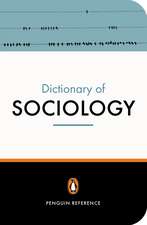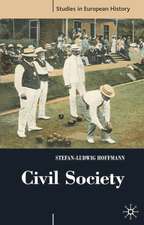Democratic Culture and Moral Character: A Study in Culture and Personality
Autor Jerome Braunen Limba Engleză Paperback – 14 iul 2015
Jerome Braun, known for his writings in interdisciplinary social science, an approach he calls pragmatic critical theory, here provides a book that discusses issues relevant to the moral underpinnings of democratic society, including issues of social evolution and of culture and personality.
This book will be of particular interest to scholars and students of Psychology (particularly in the areas of Psychology of Personality and Cultural Psychology), Sociology (especially those interested in Sociology of Alienation and Sociology of Culture, as well as Sociology of Mental Health), Anthropology (particularly in the area of Psychological Anthropology), Cultural Studies, and Social Theory in general.
| Toate formatele și edițiile | Preț | Express |
|---|---|---|
| Paperback (1) | 639.41 lei 6-8 săpt. | |
| SPRINGER NETHERLANDS – 14 iul 2015 | 639.41 lei 6-8 săpt. | |
| Hardback (1) | 645.60 lei 6-8 săpt. | |
| SPRINGER NETHERLANDS – 18 iun 2013 | 645.60 lei 6-8 săpt. |
Preț: 639.41 lei
Preț vechi: 752.24 lei
-15% Nou
Puncte Express: 959
Preț estimativ în valută:
122.35€ • 128.07$ • 101.83£
122.35€ • 128.07$ • 101.83£
Carte tipărită la comandă
Livrare economică 31 martie-14 aprilie
Preluare comenzi: 021 569.72.76
Specificații
ISBN-13: 9789400796638
ISBN-10: 9400796633
Pagini: 276
Ilustrații: IX, 264 p.
Dimensiuni: 155 x 235 x 14 mm
Greutate: 0.39 kg
Ediția:2013
Editura: SPRINGER NETHERLANDS
Colecția Springer
Locul publicării:Dordrecht, Netherlands
ISBN-10: 9400796633
Pagini: 276
Ilustrații: IX, 264 p.
Dimensiuni: 155 x 235 x 14 mm
Greutate: 0.39 kg
Ediția:2013
Editura: SPRINGER NETHERLANDS
Colecția Springer
Locul publicării:Dordrecht, Netherlands
Public țintă
ResearchCuprins
Foreword; Prof. C. Fred Alford.- Chapter 1. Introduction.- Part I. Democracy and Character.- Chapter 2. Understanding Democracy as a Prerequisite for Spreading Democracy.- Chapter 3. The Faking of Charisma and Decadence: Cultural Decay Through the Ages.- Chapter 4. Modernity and Intimacy.- Chapter 5. How Nationalism is Similar to Juvenile Delinquency.- Part II. Pragmatism and Character.- Chapter 6. Pragmatism as the Basis of American Culture in an Individualistic Society.- Chapter 7. Formal and Informal Uses of Law for Ensuring Personal Freedom: A Short Cross-Cultural Comparison.- Part III. The Evolution of Democratic Character and Culture.- Chapter 8. Limited Alternatives and Personal Identity: The Relation Between Freedom and Personal Responsibility.- Chapter 9. America as a Post-Feudal Society, or How to Relate to the Islamic World.- Chapter 10. Personal Versus Impersonal Forms of Exploitation.-Part IV. Conclusion.- Chapter 11. Politics from the Bottom Up, Rather Than the Top Down.- Chapter 12. Means and Ends in Personal Relationships.- Chapter 13. The Sense of Self in Democratic Societies.- Chapter 14. A Basic Summary on Social Evolution and Character.- Bibliography.
Notă biografică
Jerome Braun is known for his writing in interdisciplinary social science, the kind not usually covered in most Ph.D programs, with some emphasis on culture and personality and on democracy from a cross-cultural perspective. Much in the spirit of pragmatic critical theory, he started out writing on industrial democracy and on alienation in the workplace, and eventually expanded to writing on democracy in general and on alienation in the world at large. A good deal of his writing tends to lie on the border between disciplines, such as the borders between psychology and anthropology, and sociology and economics, at the same time informed by a knowledge of history, all of which produces a rather holistic point of view, partly inspired by classical sociology. In general he has studied alienation in modern society, and its effects on both culture and personality. In particular his writing on the psychology of personality, and on how the fulfillment of personality can be hampered or fostered by various kinds of social and cultural environments, is in the spirit of such humanistic writers as Erich Fromm and Christopher Lasch. He takes a rather pragmatic approach to the study of social evolution, and in this regard is much inspired by the work of Max Weber. He gave the Willard and Margaret thorp Lecture at Princeton University on October 12, 2000 where he spoke on “Liberal and Authoritarian Versions of Democracy.” He also was a consultant to the 2008 Barack Obama presidential campaign as a member of their Labor, Employment, and Workplace Policy Committee. He co-edited with Prof. George McCall Issue 192 (June 2008) of the International Social Science Journal sponsored by UNESCO devoted to the topic of “Dilemmas in Nation-Building.” His contribution is an essay on “Character, Civil Society, and Prospects for Democracy.”
Textul de pe ultima copertă
This book returns critical theory to its roots in both psychology and the social sciences. It shows some of the relationships between equality in a political and social sense and personal identity that either relates well to such equality, or rebels against it. All this reflects processes of social and cultural influence that involve not only random change but also processes of social and cultural evolution that themselves have effects regarding potentials for self-fulfillment and even public morality. This book provides a framework to help one study the interaction between individual aspirations and social opportunities.
Jerome Braun, known for his writings in interdisciplinary social science, an approach he calls pragmatic critical theory, here provides a book that discusses issues relevant to the moral underpinnings of democratic society, including issues of social evolution and of culture and personality.
This book will be of particular interest to scholars and students of Psychology (particularly in the areas of Political Psychology, Psychology of Personality and Cultural Psychology), Sociology (especially those interested in Sociology of Alienation and Sociology of Culture, as well as Historical Sociology, Political Sociology and Sociology of Mental Health), Anthropology (particularly in the areas of Psychological Anthropology and Political Anthropology), Cultural Studies, and Social Theory as well as Political Theory in general.
Jerome Braun, known for his writings in interdisciplinary social science, an approach he calls pragmatic critical theory, here provides a book that discusses issues relevant to the moral underpinnings of democratic society, including issues of social evolution and of culture and personality.
This book will be of particular interest to scholars and students of Psychology (particularly in the areas of Political Psychology, Psychology of Personality and Cultural Psychology), Sociology (especially those interested in Sociology of Alienation and Sociology of Culture, as well as Historical Sociology, Political Sociology and Sociology of Mental Health), Anthropology (particularly in the areas of Psychological Anthropology and Political Anthropology), Cultural Studies, and Social Theory as well as Political Theory in general.
Caracteristici
Illustrates the possibilities for Pragmatic Critical Theory Describes the relevance of a psychodynamic perspective for the social sciences Shows what a return of Critical Theory to its social science roots can produce Includes supplementary material: sn.pub/extras















